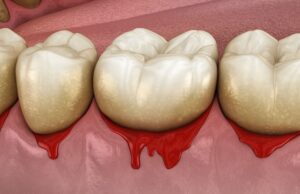A study published in the Journal of Clinical Periodontology suggests that people with gum disease can have a higher chance of suffering severe complications related to COVID-19. This is due to the inflamed gums linking with the body’s inflammatory response and worsening respiratory concerns as a result.
Though pandemic restrictions have largely lifted in many places, COVID-19 can still seriously affect your well-being. So not only will gum disease impact the look and feel of your smile, but it can pose a risk to the rest of your body. Maintaining healthy gums is crucial to preserving your overall wellness.
Attend regular appointments with your dentist to maximize preventative care for your gums. Read on to learn more about the importance of taking care of your gums, which includes seeking urgent care for gum disease.
Can I Tell I Have Gum Disease?
The early stage of gum disease, gingivitis, often presents with noticeable symptoms like swelling, redness, soreness, and bleeding in the gum tissue. These may occur for acute reasons as well like harsh teeth brushing. But if the symptoms persist, you might have gum disease.
As the infection progresses, bacteria will spread from the gums to the teeth and into the jawbone. You can start to notice looseness in your teeth, gum recession, more constant pain, and even bad breath.
However, gum disease can also occur in many patients without any recognizable symptoms. So make sure you visit your dentist for routine check-ups where they can perform a periodontal disease screening. This way they can spot gum disease you might notice and offer swift treatment.
How Can My Dentist Get Rid of Gum Disease?
When your dentist diagnoses you with gum disease, they can start treatment for this infection right away. They will begin by thoroughly cleaning your teeth. They scrape away plaque, tartar, and excess bacteria from tough-to-reach spots like deep in the gum pocket. This extensive cleaning method is known as scaling and root planing.
Your dentist may also give you an antibacterial rinse, which will balance the natural oral bacteria in your mouth. This can reduce the spread of bacteria that cause gum disease as well as alleviate uncomfortable periodontal symptoms.
If gum disease persists, which may happen in more advanced cases, they may refer you to a specialist who can offer more intensive periodontal therapy. They might need to perform gum surgery to restore your gum health.
Can I Prevent Gum Disease?
Many people contract gum disease due to poor oral hygiene. If you let plaque and food particles linger on your teeth, bacteria can more easily travel to the gums and infect them. So make sure you brush your teeth at least twice a day and floss daily to lower your risk of gum disease.
You should also attend routine teeth cleanings at your dentist’s office to maximize oral hygiene. These appointments also allow your dentist to check that your gums remain healthy.

